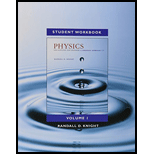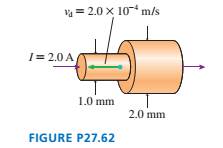
Student Workbook for Physics for Scientists and Engineers: A Strategic Approach, Vol 1. (Chs 1-21)
4th Edition
ISBN: 9780134110646
Author: Randall D. Knight (Professor Emeritus)
Publisher: PEARSON
expand_more
expand_more
format_list_bulleted
Concept explainers
Textbook Question
Chapter 27, Problem 62EAP
The two wires in FIGURE P27.62 are made of the same material. What are the current and the electron drift speed in the - mm- diameter segment of the wire?
mm- diameter segment of the wire?

Expert Solution & Answer
Want to see the full answer?
Check out a sample textbook solution
Students have asked these similar questions
suggest a reason ultrasound cleaning is better than cleaning by hand?
Checkpoint 4
The figure shows four orientations of an electric di-
pole in an external electric field. Rank the orienta-
tions according to (a) the magnitude of the torque
on the dipole and (b) the potential energy of the di-
pole, greatest first.
(1)
(2)
E
(4)
What is integrated science.
What is fractional distillation
What is simple distillation
Chapter 27 Solutions
Student Workbook for Physics for Scientists and Engineers: A Strategic Approach, Vol 1. (Chs 1-21)
Ch. 27 - Prob. 1CQCh. 27 - Prob. 2CQCh. 27 - The electron drift speed in a wire is exceedingly...Ch. 27 - Prob. 4CQCh. 27 - Prob. 5CQCh. 27 - All the wires in FIGURE Q27.6 are made of the same...Ch. 27 - Both batteries in FIGURE Q27.7 are ideal and...Ch. 27 - Both batteries in FIGURE Q27.8 are ideal and...Ch. 27 - The wire in FIGURE Q27.9 consists of two segments...Ch. 27 - Prob. 10CQ
Ch. 27 - ll. The wires in FIGURE Q27.11 are all made of the...Ch. 27 - Which, if any, of these statements are true? (More...Ch. 27 - Prob. 1EAPCh. 27 - Prob. 2EAPCh. 27 - .0 × 1016 electrons flow through a cross section...Ch. 27 - Prob. 4EAPCh. 27 - Prob. 5EAPCh. 27 - Prob. 6EAPCh. 27 - Prob. 7EAPCh. 27 - Prob. 8EAPCh. 27 - Prob. 9EAPCh. 27 - Prob. 10EAPCh. 27 - Prob. 11EAPCh. 27 - The current in an electric hair dryer is 10.0 A....Ch. 27 -
13. When a nerve cell fires, charge is...Ch. 27 - Prob. 14EAPCh. 27 - Prob. 15EAPCh. 27 - Prob. 16EAPCh. 27 - Prob. 17EAPCh. 27 - Prob. 18EAPCh. 27 - Prob. 19EAPCh. 27 - Prob. 20EAPCh. 27 - Prob. 21EAPCh. 27 - Prob. 22EAPCh. 27 - Prob. 23EAPCh. 27 - 24. The two segments of the wire in FIGURE EX27.24...Ch. 27 - A 1.5 V battery provides 0.50 A of current. a. At...Ch. 27 - Prob. 26EAPCh. 27 - Prob. 27EAPCh. 27 - Prob. 28EAPCh. 27 - Prob. 29EAPCh. 27 - Prob. 30EAPCh. 27 - Prob. 31EAPCh. 27 - Prob. 32EAPCh. 27 - Prob. 33EAPCh. 27 - Prob. 34EAPCh. 27 - Prob. 35EAPCh. 27 - Prob. 36EAPCh. 27 - Prob. 37EAPCh. 27 - Prob. 38EAPCh. 27 - Prob. 39EAPCh. 27 - Prob. 40EAPCh. 27 - Prob. 41EAPCh. 27 - Prob. 42EAPCh. 27 - Prob. 43EAPCh. 27 - Prob. 44EAPCh. 27 - Prob. 45EAPCh. 27 - Prob. 46EAPCh. 27 - Prob. 47EAPCh. 27 - Prob. 48EAPCh. 27 - Prob. 49EAPCh. 27 - Variations in the resistivity of blood can give...Ch. 27 - The conducting path between the right hand and the...Ch. 27 - The conductive tissues of the upper leg can be...Ch. 27 - The resistivity of a metal increases slightly with...Ch. 27 - Prob. 54EAPCh. 27 - You need to design a 1.0 A fuse that “blows” if...Ch. 27 - I A hollow metal cylinder has inner radius a....Ch. 27 - A hollow metal sphere has inner radius a, outer...Ch. 27 - The total amount of charge in coulombs that has...Ch. 27 - The total amount of charge that has entered a wire...Ch. 27 - The current in a wire at time t is given by the...Ch. 27 - The current supplied by a battery slowly decreases...Ch. 27 - The two wires in FIGURE P27.62 are made of the...Ch. 27 - What diameter should the nichrome wire in FIGURE...Ch. 27 - An aluminum wire consists of the three segments...Ch. 27 - A wire of radius R has a current density that...Ch. 27 - A 0.60 -mm-diameter wire made from an alloy (a...Ch. 27 - A 20 -cm-long hollow nichrome tube of inner...Ch. 27 - Prob. 68EAPCh. 27 - Prob. 69EAPCh. 27 - Prob. 70EAPCh. 27 - Prob. 71EAPCh. 27 - Prob. 72EAPCh. 27 - Prob. 73EAPCh. 27 - Prob. 74EAPCh. 27 - Prob. 75EAPCh. 27 - Prob. 76EAP
Knowledge Booster
Learn more about
Need a deep-dive on the concept behind this application? Look no further. Learn more about this topic, physics and related others by exploring similar questions and additional content below.Similar questions
- 19:39 · C Chegg 1 69% ✓ The compound beam is fixed at Ę and supported by rollers at A and B. There are pins at C and D. Take F=1700 lb. (Figure 1) Figure 800 lb ||-5- F 600 lb بتا D E C BO 10 ft 5 ft 4 ft-—— 6 ft — 5 ft- Solved Part A The compound beam is fixed at E and... Hình ảnh có thể có bản quyền. Tìm hiểu thêm Problem A-12 % Chia sẻ kip 800 lb Truy cập ) D Lưu of C 600 lb |-sa+ 10ft 5ft 4ft6ft D E 5 ft- Trying Cheaa Những kết quả này có hữu ích không? There are pins at C and D To F-1200 Egue!) Chegg Solved The compound b... Có Không ☑ ||| Chegg 10 וחarrow_forwardNo chatgpt pls will upvotearrow_forwardNo chatgpt pls will upvotearrow_forward
- No chatgpt pls will upvotearrow_forwardair is pushed steadily though a forced air pipe at a steady speed of 4.0 m/s. the pipe measures 56 cm by 22 cm. how fast will air move though a narrower portion of the pipe that is also rectangular and measures 32 cm by 22 cmarrow_forwardNo chatgpt pls will upvotearrow_forward
- 13.87 ... Interplanetary Navigation. The most efficient way to send a spacecraft from the earth to another planet is by using a Hohmann transfer orbit (Fig. P13.87). If the orbits of the departure and destination planets are circular, the Hohmann transfer orbit is an elliptical orbit whose perihelion and aphelion are tangent to the orbits of the two planets. The rockets are fired briefly at the depar- ture planet to put the spacecraft into the transfer orbit; the spacecraft then coasts until it reaches the destination planet. The rockets are then fired again to put the spacecraft into the same orbit about the sun as the destination planet. (a) For a flight from earth to Mars, in what direction must the rockets be fired at the earth and at Mars: in the direction of motion, or opposite the direction of motion? What about for a flight from Mars to the earth? (b) How long does a one- way trip from the the earth to Mars take, between the firings of the rockets? (c) To reach Mars from the…arrow_forwardNo chatgpt pls will upvotearrow_forwarda cubic foot of argon at 20 degrees celsius is isentropically compressed from 1 atm to 425 KPa. What is the new temperature and density?arrow_forward
- Calculate the variance of the calculated accelerations. The free fall height was 1753 mm. The measured release and catch times were: 222.22 800.00 61.11 641.67 0.00 588.89 11.11 588.89 8.33 588.89 11.11 588.89 5.56 586.11 2.78 583.33 Give in the answer window the calculated repeated experiment variance in m/s2.arrow_forwardNo chatgpt pls will upvotearrow_forwardCan you help me solve the questions pleasearrow_forward
arrow_back_ios
SEE MORE QUESTIONS
arrow_forward_ios
Recommended textbooks for you
 Physics for Scientists and Engineers with Modern ...PhysicsISBN:9781337553292Author:Raymond A. Serway, John W. JewettPublisher:Cengage Learning
Physics for Scientists and Engineers with Modern ...PhysicsISBN:9781337553292Author:Raymond A. Serway, John W. JewettPublisher:Cengage Learning Physics for Scientists and Engineers: Foundations...PhysicsISBN:9781133939146Author:Katz, Debora M.Publisher:Cengage Learning
Physics for Scientists and Engineers: Foundations...PhysicsISBN:9781133939146Author:Katz, Debora M.Publisher:Cengage Learning
 Principles of Physics: A Calculus-Based TextPhysicsISBN:9781133104261Author:Raymond A. Serway, John W. JewettPublisher:Cengage Learning
Principles of Physics: A Calculus-Based TextPhysicsISBN:9781133104261Author:Raymond A. Serway, John W. JewettPublisher:Cengage Learning College PhysicsPhysicsISBN:9781305952300Author:Raymond A. Serway, Chris VuillePublisher:Cengage Learning
College PhysicsPhysicsISBN:9781305952300Author:Raymond A. Serway, Chris VuillePublisher:Cengage Learning College PhysicsPhysicsISBN:9781285737027Author:Raymond A. Serway, Chris VuillePublisher:Cengage Learning
College PhysicsPhysicsISBN:9781285737027Author:Raymond A. Serway, Chris VuillePublisher:Cengage Learning

Physics for Scientists and Engineers with Modern ...
Physics
ISBN:9781337553292
Author:Raymond A. Serway, John W. Jewett
Publisher:Cengage Learning

Physics for Scientists and Engineers: Foundations...
Physics
ISBN:9781133939146
Author:Katz, Debora M.
Publisher:Cengage Learning


Principles of Physics: A Calculus-Based Text
Physics
ISBN:9781133104261
Author:Raymond A. Serway, John W. Jewett
Publisher:Cengage Learning

College Physics
Physics
ISBN:9781305952300
Author:Raymond A. Serway, Chris Vuille
Publisher:Cengage Learning

College Physics
Physics
ISBN:9781285737027
Author:Raymond A. Serway, Chris Vuille
Publisher:Cengage Learning
Circuits, Voltage, Resistance, Current - Physics 101 / AP Physics Review with Dianna Cowern; Author: Physics Girl;https://www.youtube.com/watch?v=q8X2gcPVwO0;License: Standard YouTube License, CC-BY